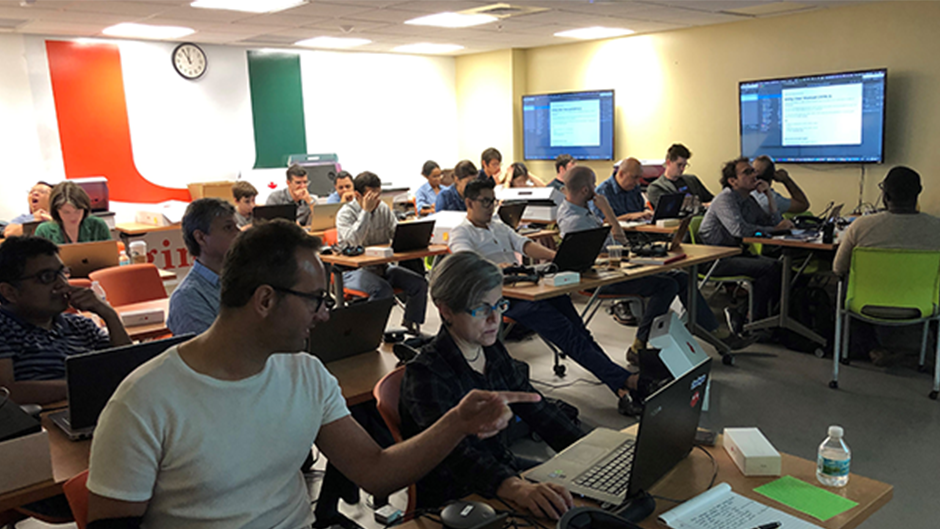Augmented reality and virtual reality will soon be been actively implemented in the classroom as a new way to teach and engage students. The University of Miami and Magic Leap have joined forces to introduce a new era of education around spatial computing and mixed reality, bridging the digital and physical worlds.
Now University of Miami faculty can now get their hands on the emerging technology, as well as the necessary training, on campus.
Magic Leap – the leading spatial computing company – recently held a series of workshops to introduce its technologies to faculty around the university. Spatial computing, which is considered by experts to be the future of computing, seamlessly integrates digital content into the surrounding physical environment.
The first exercise introduced faculty to the Magic Leap One – a lightweight, wearable computer that seamlessly blends the digital and physical worlds. Faculty learned how to set it up and use it, and the workshop laid the groundwork for development.
“This is an important step for faculty, considering that they will be the ones walking students and/or other faculty through this process in the future,” explained Kojo Opuni, who led the workshop. Opuni is a former interactive visual designer and prototyper at Magic Leap, as well as a former adjunct professor in the UM School of Communication’s Department of Cinema and Interactive Media.
The workshop, which was offered is designed for faculty of any skill level, allowed faculty to get acquainted with the Magic Leap One as well as get an overview of the various development platforms (Unity 3D, Lumin Runtime, etc.) available to create applications for the device.
Participants participated in the full out-of-box experience: setting up the device for development, setting up their laptops for development, getting acquainted with the Magic Leap Creator’s Portal – resources for developers, designers, artists, and publishers to provide essential tools to create experiences in the Magicverse – becoming familiar with the available tutorials online and, on a high level, learning how to develop applications on a few of the available development platforms.
In today’s tech-oriented world, spatial computing and mixed reality present seemingly boundless opportunities.
“It is a medium with tremendous potential to positively affect the lives of many in the immediate now and the distant future if implemented correctly,” Opuni said. “When I say implemented correctly, I mean that the right tools are created within the medium to allow many – and not [only] a few – to create the applications and experiences that they wish to share with the wider world.”
The academic partnership between the University and Magic Leap will promote the exploration and implementation of applications in spatial computing that will revolutionize the way students at the University and around the world learn.
“These new technologies are creating a new experience within the classroom,” Opuni said. “Virtual, augmented and mixed reality increases the level of immersion, which, in kind, can increase the understanding and engagement of any subject matter. That alone can make a world of difference in the learning experience for students.”
Opuni believes Magic Leap’s mixed reality holds tremendous potential for educational purposes in many fields and has high hopes for its application beyond the classroom.
“This new technology will foster connection, rather than disconnection, between people and will allow others to connect with the immediate world right before them rather than turn away from it,” Opuni said.
As with any new technology, there will be hurdles that need to be overcome. Opuni urges faculty to exercise patience with themselves and students when incorporating new technologies in the classroom.
“It’s a process,” Opuni said. “Everyone is learning along the way and many of the challenges users may face may be the first of their kind in the classroom or in a research setting. By exercising patience, you may end up becoming an expert in new technology.”

